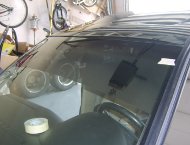3/21/2013
Florida: Federal Appeals Court Upholds Window Tint PretextEleventh Circuit US Court of Appeals upholds pretext stop based on window tint.

The Eleventh US Court of Appeals ruled on Monday that police interested in searching a car for drugs may use any pretext, no matter how flimsy. Bryan E. Parker found this out after Hillsborough County, Florida Sheriff's deputies stopped him on May 27, 2011 for having a "sun band" of tint on his windshield that went slightly below the "AS1 line." As a matter of policy, the sheriff's office does not ordinarily even issue citations for tint violations.
Instead, the sheriff's department Green Team had been following Parker after receiving an anonymous tip that he was selling drugs out of his mother's home in Odessa, where he lived. On every occasion the officers stopped by the home, they received consent for a search that ended without anything illegal being found.
"Those same people have been messing with me for over a year," Joyce explained at trial. "The same green team. They been coming to my house, searching my house and my truck, everything right there in the yard."
When Deputy Daniel Joyce pulled over Parker for the tint, six additional backup units arrived. A drug dog named Bullit alerted on Parker's truck and a search turned up a marijuana cigarette. A broader search turned up a Ruger .22 caliber rifle and North American Arms Corp. .22 caliber revolver. Because of a previous conviction on narcotics charges, Parker was arrested on gun possession charges.
"I'm getting charged for, you know, 15 years for nothing," Parker said. "And then I got the old raggily gun and little tiny Derringer that, you know, I wasn't trying to go out and kill nobody or nothing. The gun -- one gun didn't even work."
During his trial in federal court, Parker's public defender tried to have the evidence suppressed because of the "unlawful and unconstitutional conduct" of the officers. The judge refused to do so saying he had no choice, regardless of the motivations of the officers.
"No, I'm not sure that what they did was fair," Judge James S. Moody told Parker from the bench. "My suspicion is that they stopped you under pretense for the purpose of searching your vehicle, but that's appropriate under the law, and I ruled based on the law. I ruled that what they did was legal and that the search was legal and that the search was incident to a traffic stop. It doesn't matter whether I think it's fair or not."
The three judge appellate panel sided with Moody.
"Given the need for Deputy Joyce to locate the applicable statute and the later canine alert to narcotics in the truck, subsequently resulting in a search, Parker's stop was not unjustifiably prolonged," the Eleventh Circuit ruled. "Any delay was reasonable and minimally intrusive, particularly since the entire stop only lasted between thirty and forty minutes. Therefore, we affirm the district court's denial of Parker's motion to suppress."
A copy of the decision is available in a 40k PDF file at the source link below.


